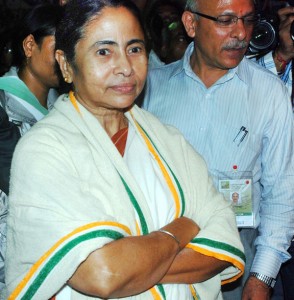An excerpt from Didi: A Political Biography, a book on Mamata Banerjee, written by Monobina Gupta, examines how being a woman of power is not synonymous with being a feminist
By Monobina Gupta
While she is that rarity, a self-made female leader, Mamata vehemently denies any affinity to feminism. ‘She is not a feminist. Mamata is just Mamata,’ writer Mahasweta Devi told me. Director Arpita Ghosh believes that even though Mamata may deny any connection to feminism, she has indeed ‘lived her life as a feminist’. She had no benevolent male patron (except, for a very brief stint, Rajiv Gandhi), no father, brother, husband, partner prodding from the sidelines. Despite many references in her books to members of her large family—sisters-in-law, brothers, nieces, nephews—the Trinamool president believes that her party is her ‘very own family’.
In fact, viewed through the gender lens, Mamata’s story does indeed stand apart from the narratives of India’s most powerful contemporary women leaders. Says Krishna Bose, ‘Mamata has not been the widow, wife, daughter or companion of somebody.’… Sujato Bhadra, of the Association for the Protection of Democratic Rights (APDR), says Mamata, like Medha Patkar, the mass leader of the Narmada Bachao Andolan, does not challenge social and cultural conventions—or even the ground rules of patriarchy—through her politics or movements. ‘I have worked with Medha Patkar. The one time I was living with some activists in Badwani, I saw a woman activist who was actively engaged with the movement, but still continued with the feudal practices in her family.’ According to him, Medha believed in enlisting the support of the whole family and, therefore, did not risk their hostility by questioning the patriarchal, feudal norms.
In her books, Mamata deals with women’s issues like gender based violence, oppression, economic independence, and so on. As a minister in the Narasimha Rao government, she was briefly in charge of the Department of Women and Children. Her negotiation with gender is conventional and non-radical. In keeping with abstract principles of universal goodness and equality that she holds true, her understanding of women’s issues is unmediated by complexities. She falls prey to nuggets of conventional ‘wisdom’. For instance, she writes: ‘We often find opportunist women from the upper social strata living as they want to. In the name of liberation, they greatly abuse their independence. If such a woman’s family raises objections, she tends to use the law as a weapon of blackmail. Like many women, men too are victims of abuse.’
In another instance, she explains that women play a critical role in building a happy family and, therefore, contributing to the well-being of the society, but they are unfortunately also sometimes responsible for creating unrest in a family. Women often cannot stand other women, resulting in the mutual harassment of daughters-in-law and mothers-in-law. Undoubtedly, these are not the thoughts of a feminist.
The issue of domestic violence surfaces repeatedly in Mamata’s books. Characteristically, she relates to these subjects through isolated incidents, personal experiences of the women she knew, her colleagues whose lives ended tragically. In her book Ekante, she narrates the experiences of three victims, Jharna, Anjali and Manju, two of whom took their own lives, while the third was set ablaze by her husband.
Mamata’s narrative does not indicate any effort on her part to contextualize domestic violence within the larger and pervasive phenomenon of patriarchy, control and masculine power. Perhaps this is not surprising given her proclivity to limit the scope of any issue at hand to lived-in experiences, sometimes her own, at other times, of people she knew and cared about.
Mamata, therefore, views domestic violence through the lens of her intense emotions, as a string of terrible tragedies that befell women she had closely worked with and had wanted to protect. Anguished by the repeated occurrence of violence within the four walls of private and intimate space, Mamata’s response, typically, was passionately emotional. ‘Despite their zest for life and their energy, Jharna, Anjali and Manju ended their lives under the shadow of their personal tragedies. Several years have gone by since their deaths. But even today their faces are engraved on my heart, their thoughts I carry with me in my innermost recesses. I am pained each time I remember their faces; I do not know when the agony will end. They have ended their physical lives, but will God ever forgive those responsible for their deaths?’
Mamata’s negotiation with gender has been mediated by the spirit of welfare and social service. For instance, as a Central minister for women and children, she wanted to improve the condition of sex workers, the ‘neglected people’ in society. Unlike many feminists, whose analysis of gender-based violence and exploitation is grounded not in victimhood but ‘agency’, Mamata’s approach is traditional, centred on the notion of women as victims. It is interesting to note here that Mamata’s perception of herself is as a permanent victim of sorts.
Though she has no access to a feminist vocabulary and cannot be ideologically described as one, her emergence as a single-woman leader of lower-middle-class origin fighting with her back to the wall does situate her in a feminist context. Perhaps Mamata’s own perception of herself as a woman leader of Opposition in a state known for its political violence, headed by an essentially male establishment, has given her the image of a feminist; though she herself does not perceive herself as one.
This article was originally published on FIRSTPOST. Monobina Gupta is a journalist with the Times of India
